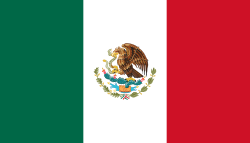| Mexico at the Olympics | |
|---|---|
 | |
| IOC code | MEX |
| NOC | Mexican Olympic Committee |
| Website | www |
| Medals Ranked 55th |
|
| Summer appearances | |
| Winter appearances | |
Mexico first participated at the Olympic Games in 1900 and has sent athletes to compete in every Summer Olympic Games since 1924. Mexico has also participated in several Winter Olympic Games since 1928, though has not yet won any medals in the Winter Olympics.
Contents
- Hosted Games
- Medals
- Medals by Summer Games
- Medals by Winter Games
- Medals by Summer Sport
- List of medalists
- Summer Olympics
- Multiple Mexican Olympic medalists
- See also
- References
- External links
Mexican athletes have won a total of 77 medals, with diving as the top medal-producing sport. [1]
The National Olympic Committee for Mexico is the Mexican Olympic Committee and was created in 1923.


